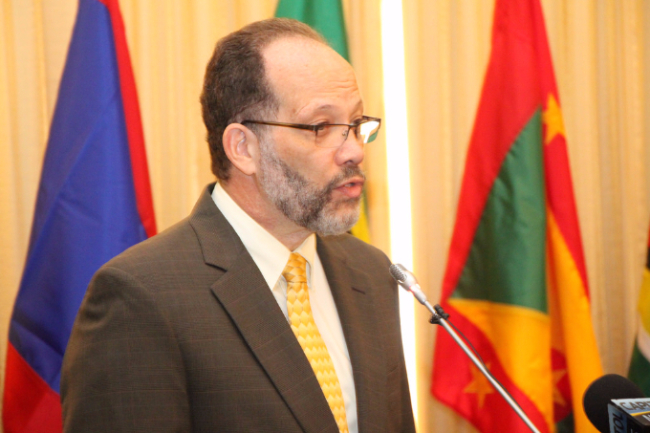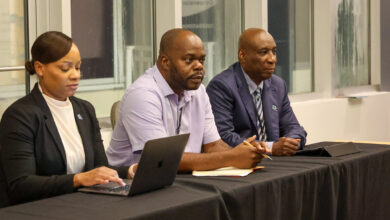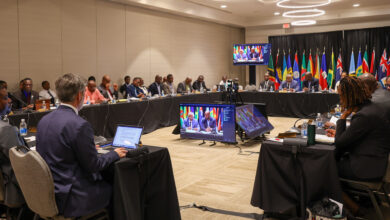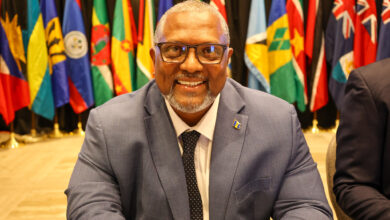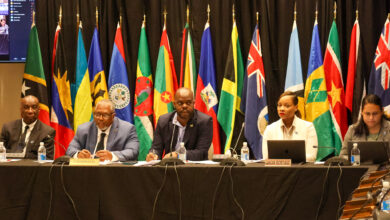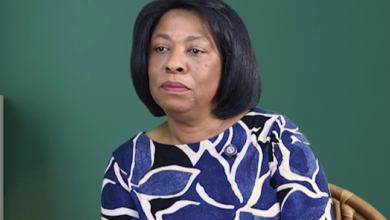(CARICOM Secretariat, Turkeyen, Greater Georgetown, Guyana) I welcome you all to this Fortieth Meeting of the Council for Trade and Economic Development (COTED). I extend a particularly warm welcome to our Chairman, Minister Claude Hogan who, while not a stranger to this Council, is attending his first COTED as Minister.
Today’s welcome is special, given that Montserrat has received the requisite entrustment from the United Kingdom that will allow it to accede to the Revised Treaty of Chaguaramas, Including the CARICOM Single Market and Economy (CSME). I look forward to the early completion of the necessary procedures to allow for such accession.
To those other Ministers attending their first COTED, the Honourable Everly Greene, Minister of Trade, Commerce and Industry of Antigua and Barbuda, and the Honourable Ian Douglas, Minister of Trade, Energy and Employment of Dominica, I also bid you a warm welcome to the Council.
I also extend a CARICOM greeting to Honourable Yerzhan Ashikbayev, Deputy Minister of Foreign Affairs of Kazakhstan who, with his delegation, will be addressing us later this morning on Expo Astana 2017.
Ministers, as you gather here for this Meeting, you do so as our Community’s determination to consolidate the gains of the CSME assumes greater urgency. That urgency is fuelled by the continuing challenges faced by our Member States due to the volatile global economic environment.
In our ceaseless efforts to boost our growth and economic prospects, utilising the provisions of the CSME to its fullest, provides us with the best option. It would allow us to exploit the full potential of our human resources as our skilled personnel move freely throughout the Community. The easier movement of capital would help to generate much needed investment. Our trade in goods and services can only be enhanced by the removal of whatever restrictions still remain.
The Secretariat, in its continuing quest to improve the efficiency of the systems and processes under the CSME, is assisting Member States in making it more user-friendly. The CARICOM Trade and Competitiveness Project, funded by Canada, is aimed at improving the operational effectiveness of the Single Market as well as the access of nationals to their rights under the Single Market regimes.
That project would transform and harmonise the administrative practices and procedures under the five regimes of the CSME, and would also provide for the application of web-based technology.
Once this Council takes the necessary decisions, those seeking skills certificates, for example, would be able to do so online in any Member State. The programme has the added bonus of furthering e-government processes in Member States.
This is all part of our goal to create the environment that allows for all stakeholders to function efficiently and effectively within the CSME.
We need, for example, to ensure that SPS regulations, which are intended to safeguard our plant and animal health and food safety, are applied in a manner that facilitates trade in agricultural products, rather than hinder it.
We need a vibrant and dynamic private sector.
Its indispensable role must be supported by a regime of harmonised laws, regulations and administrative procedures which would make doing business in the Region easier. It would also lower the cost of doing business. The private sector has repeatedly made this point to me in my consultations with them throughout the Region.
That enabling environment would encourage the creation and seizing of opportunities within the CSME. This would set the stage for increasing intra-regional trade and investment, as well as for generating employment and growth, which are primary goals of the Community.
Strong intra-regional trade would not only improve the economic growth prospects of Member States but also serve as a platform for entry into the international trading arena.
In pursuing our opportunities in that sphere, the Region has demonstrated significant flexibility and has submitted proposals to Canada, which in our view would set the stage for continuing and concluding the trade negotiations. We are awaiting a response from Canada.
In promoting our efforts to have Trade in Services included under the US Caribbean Basin Economic Recovery Act (CBERA), the issue was put before President Obama at the recent Summit in Jamaica. We will work with the private sector and ensure that the necessary technical work is done so we can continue to advance our case at the CARICOM-US Trade and Investment Council.
We need to make progress with respect to furthering our trade relations with Cuba. I urge this Council to take the necessary decisions that would advance this matter in such a manner that would enhance our relations with a country that has been a good friend to us.
Trading relations should be viewed within the larger picture of the Community’s foreign relations, even as we take into account certain product sensitivities. The pursuit of our diplomatic goals and the securing of trade agreements are both elements of positioning the Community advantageously in the global arena.
Mr Chairman, our task is therefore very clear. Let us take those decisions that would allow us to increase our intra-regional trade and consolidate the gains of our Single Market and Economy while securing external markets.
Before closing, I must thank our officials for their hard work over the first two days of the week. The report and recommendations coming out of their deliberations will, no doubt, provide a solid basis to guide the decisions coming out of this meeting. I look forward to a very productive session in the interest of the growth and development of our Community.
I thank you.
Press ReleasesSpeeches
Opening Remarks by Ambassador Irwin LaRocque Secretary-General, Caribbean Community at The Fortieth Council For Trade and Economic Development (COTED)
